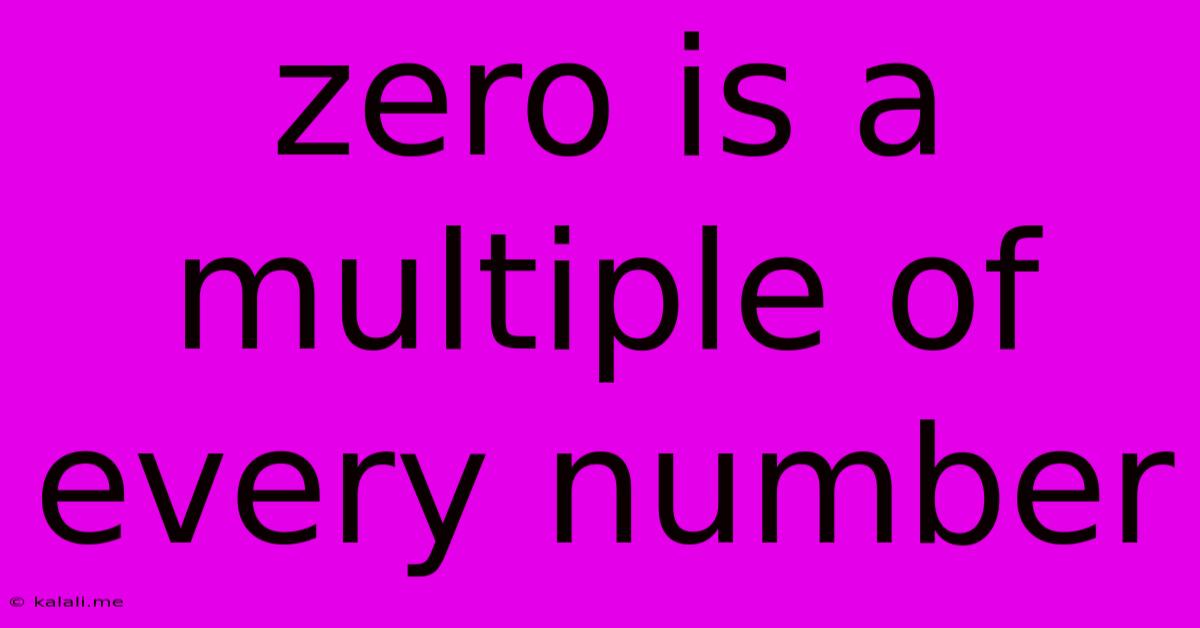Zero Is A Multiple Of Every Number
Kalali
May 20, 2025 · 2 min read

Table of Contents
Zero is a Multiple of Every Number: Understanding the Concept
Meta Description: Dive into the mathematical concept that zero is a multiple of every number. This article explains why, exploring the definition of multiples and dispelling common misconceptions. Learn the underlying logic and solidify your understanding of this fundamental mathematical principle.
The statement "zero is a multiple of every number" might seem counterintuitive at first glance. Many associate multiples with a sense of "repeated addition," making the idea of zero being a multiple of, say, 7, feel strange. However, a deeper understanding of the definition of "multiple" reveals the inherent truth of this statement.
Understanding Multiples
A multiple of a number is the result of multiplying that number by any integer (whole number, including negative numbers and zero). For example, the multiples of 5 are: ... -15, -10, -5, 0, 5, 10, 15, ... Notice that zero is included in this list.
Let's formalize this definition: If 'n' is a number, then a multiple of 'n' is any number that can be expressed in the form n * k, where 'k' is an integer.
Why Zero is a Multiple of Every Number
Now, let's consider the case of zero. If we want to determine if zero is a multiple of any number, say 'n', we need to see if we can express zero in the form n * k, where k is an integer.
We can easily do this: n * 0 = 0
This equation holds true for any value of 'n'. No matter what number 'n' represents, multiplying it by zero always results in zero. Therefore, zero satisfies the definition of being a multiple of every number.
Addressing Common Misconceptions
Some might argue that zero shouldn't be considered a multiple because it doesn't represent a "repeated addition" in the traditional sense. While this intuitive understanding is valid for positive multiples, the formal mathematical definition of multiples encompasses zero as well. The formal definition is based on multiplication, not solely on repeated addition. This expands the concept of multiples to include cases involving zero.
Zero and the Properties of Multiplication
The property of multiplication that makes this possible is the multiplicative property of zero. This property states that any number multiplied by zero equals zero. This fundamental property underpins the fact that zero is a multiple of all numbers.
Practical Applications
While this might seem like an abstract mathematical concept, understanding that zero is a multiple of every number is crucial in various mathematical fields, including algebra, number theory, and even more advanced areas like abstract algebra.
Conclusion
In conclusion, zero is a multiple of every number due to the fundamental multiplicative property of zero. Although it might deviate from the intuitive understanding of multiples, it aligns perfectly with the formal mathematical definition, making the statement mathematically sound and logically consistent. Understanding this concept solidifies a crucial foundation in mathematics.
Latest Posts
Latest Posts
-
What Size Drill Bit For A Red Wall Plug
May 20, 2025
-
Things To Say To Someone Going On Maternity Leave
May 20, 2025
-
Why Is Zinc Not A Transition Metal
May 20, 2025
-
Car Is Making Grinding Noise When I Brake
May 20, 2025
-
A Totally Different Line Of Thought
May 20, 2025
Related Post
Thank you for visiting our website which covers about Zero Is A Multiple Of Every Number . We hope the information provided has been useful to you. Feel free to contact us if you have any questions or need further assistance. See you next time and don't miss to bookmark.